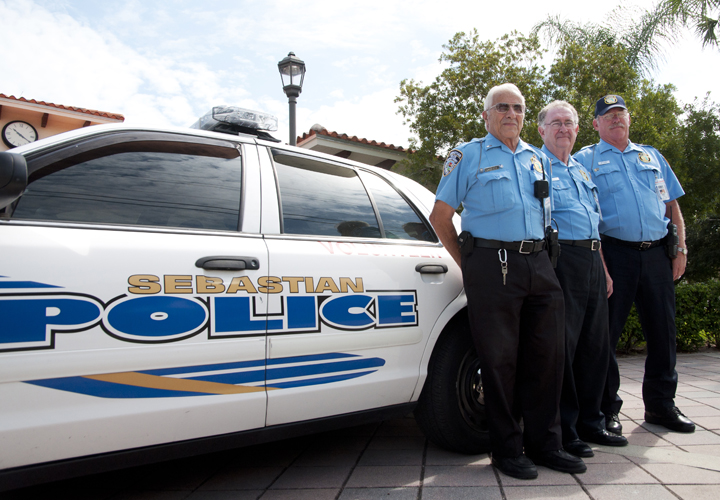
“These guys – and gal – are the lifeblood of the agency.” That is how Sebastian Police Chief Michelle Morris describes the Sebastian Police Department’s Volunteer Unit.
The chief goes on to say that this extremely dedicated, hardworking crew of about 19 members, currently saves the department “a LOT of money and man-hours,” performing numerous and varied duties that are not required to be performed by law enforcement officers.
“They will come out at 2 a.m. to help locate a lost or missing elderly person or child. In a crash, their assistance is a godsend. We have 60-plus paid employees but we wouldn’t be able to keep up without our volunteers.”
In 1990-91, there were five volunteers who helped the police department in the mail room, performed house watches and served as couriers between the SPD and the county courthouse.
Long-time volunteer Barney Giordan joined the National Guard at 16, then served with the Army in Korea. Later he spent a decade as an IRC Sheriff’s Department volunteer, before joining the SPD unit two years ago.
He explains that today’s Sebastian Police Volunteer Unit was officially formed in March, 1992, under then Police Chief Earl Petty “through the Community Service Volunteer Program.” The unit originally consisted of three Sebastian residents who assisted the police officers by relieving them of necessary but time-consuming tasks, thus freeing the officers to attend to other priorities.
The early duties, many of which are still accomplished by the volunteers, Giordan says, “included security checks on local residences while owners were away; checks on businesses, public facilities, parks and the airport; funeral escorts; traffic control; missing person searches; routine official deliveries to the county sheriff, County Commission and court officials; and serving as the ‘eyes’ of the community for crime prevention and community assistance.”
From the beginning, police officers trained the volunteers, following requirements established by the state. “Originally,” Giordan explained, “code enforcement, now a paid city staff position, was among volunteer duties.”
Volunteers must also meet state and SPD standards before serving as school crossing guards. A recent addition to Volunteer Unit duties is assisting in delivery for the Sebastian Meals on Wheels program.
An SPD volunteer will typically work two 6 a.m. to noon shifts per week, with volunteers also assigned for 24-hour on-call.
The unit, explains Morris, basically runs itself, and has its own captain and subordinate officers, with SPD Administrative Assistant Debbie Curry overseeing the unit. Each volunteer carries a police radio and wears a light blue uniform shirt displaying the Sebastian Volunteer Police logo.
But, they all emphasize, “We do not carry firearms. We are NOT cops. We are a support group.”
The seven Volunteer Unit vehicles, says Morris, are SPD police cars retired from regular duty, provided when the department obtains new vehicles. Greg Schmidt, of the city garage, “picks a list of cars we’re retiring from the fleet, about every two years.”
Each vehicle is clearly marked as a volunteer unit and further identified with amber lights. Each is fitted out with standard police equipment including flashlights, traffic vests, raincoats, first aid kits, fire extinguishers, illegal parking warning slips.
Around an SPD conference table, several volunteers talked about their experiences, their backgrounds – and their longevity. The average age of the members is currently about 75. John Lacenere is 83. He served in the Air Force, then worked for 36 years with an electric utility; Captain in Charge Paul Roughsedge is a comparatively young 72, and came to Sebastian by way of Middletown, NY, Yonkers, and Boston, where he drove a bus for 27 years before retiring to Miami. Both put in volunteer hours virtually every day. Giordan is 84.
“The unit,” says Chief Morris, “is pretty much self-run by these three.”
Long-time volunteers Joe Gavagan and Lloyd Danner retired from the unit at an impressive 93 years of age. Danner, Morris added sadly, “passed away about six months ago.”
Formerly a contractor from New York state, George Myrick volunteered with the IRC Sheriff’s Office from 1994 to 2000. In 2002, he volunteered with the SPD, quit, returned, and is now a training officer for new volunteers. “I’ve been a volunteer all my life,” Myrick says. “He trained me,” says Lacenere.
“They are such a diverse group, often with military or law enforcement backgrounds. They do so much for us,” Morris reiterates. Not everyone, however, has the temperament required for the often demanding, stressful job. “They need to be able to work under structure, discipline, chain of command. And some people can be just nasty (to the volunteers).” For example, at last year’s Sebastian Fourth of July celebration, she says, when the volunteers were assisting with parking, drivers would speak rudely, make hand gestures, “when our volunteers were simply trying to keep everyone safe and sound.”
Under those circumstances, the volunteer officers have to be able to keep their cool.
“True,” Gavagan agreed. “You can’t have a short fuse. Safety is a priority.”
“But I get very, VERY few complaints,” Morris emphasizes. To which Lacenere responds, “The treatment we get here is fantastic. They treat us like family.” All the men agree. And, adds Giordan, “the residents are pretty supportive. People search us out. They donate to the unit, which helps offset the cost of uniforms and equipment, and give us lots of ‘atta boys.’ We often get stopped and asked questions. People respect the uniform.”
“I wish I had 25 more like them,” says the chief.



